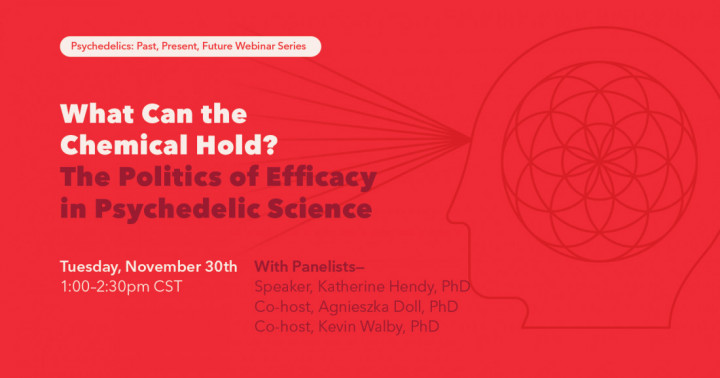
Dr. Katherine Hendy, University of Michigan
Drawing from ethnographic research with psychedelic therapists and researchers, this talk will explore the political tensions between two sources of efficacy within psychedelic therapy: the self and the chemical. At times researchers and therapists emphasize the specificity of chemical effects in relationship to the neurobiology of particular diagnoses. And at other times they foreground the self as the true source of an experience which is not tied to that same biochemistry. Anthropologists have long emphasized that efficacy is a historically and socially embedded category and practice. Those conversations have new valence in light of recent theorization of the chemicals as material-semiotic structures shaped by their experimental contexts. Drawing from the work of Annmarie Mol, I argue that while the empirical claims embedded in these two efficacies can and do mutually include each other, a fundamental political tension remains between the efficacious ends envisioned by each. As clinical trials develop these drugs as therapeutic agents, they do so through linking the specific effects of the chemical to particular diagnostic populations, which may enfranchise these chemicals, but not all who take them. The fifth speaker in the Centre for Access to Information and Justice (CAIJ) Psychedelics: Past, Present, Future Webinar Series.
Dr. Katherine Hendy is a medical anthropologist and science studies scholar who uses ethnographic methods to investigate how biomedical knowledge produced in different settings--clinics, laboratories, and trials--is taken up by different groups of actors. Dr. Hendy has a Ph.D. from the University of California at Berkeley in sociocultural anthropology and a M.A. from the University of Chicago in the social sciences. Her doctoral research ethnographically followed the development of the drug MDMA—better known as the recreational drug “ecstasy”—as a treatment for posttraumatic stress disorder. Her research argues that the “outsider” status of MDMA-assisted therapy makes it a critical site for examining how claims about pharmaceutical safety and efficacy are produced and move between different experimental settings. Her dissertation and forthcoming publications track the development of a “documentary apparatus”--i.e. psychometric tests, protocols, and case report forms--that could transform New Age therapeutic techniques, embodied practices and subjective states into standardized, objective, bureaucratic evidence of MDMA’s efficacy and safety.